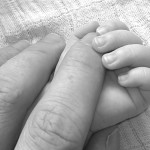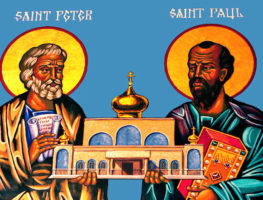I grew up attending a Methodist Church where my uncle was the pastor. As a young boy I was convinced he had the greatest job in the world. He seemed to work about one hour a week on Sundays (the joke was on me) and then come home to eat a roast his wife had made in the crockpot, smoke a pipe, and watch football.
In high school I went to a conservative evangelical summer camp. There I discovered that God was really mad at me and was planning on sending me to hell, which I was assured was far hotter than the campfire that we were gathered around. Not wanting to be thrown into the campfire I decided to “ask Jesus into my heart” in order for God to change my reservation from hell to a mansion in heaven.
Having prayed the magic prayer, which the Methodists didn’t seem to know about, I then joined a Southern Baptist Church. There I was informed that I had not “really” been baptized as an infant and that I would need to be baptized “for real.” This meant immersion.
It would be years later before I really cared about Jesus, not simply avoiding hell. Truth be told, I have actually been baptized four times in my life making me an ana-ana-ana-baptist. Thankfully the last one seemed to work!
I tell this bit of my story to say that my realization of the disunity of the church began early on. I didn’t understand it theologically, but practically I knew that there was a difference in the church of my childhood and the church of my teenage years. They did things differently, believed differently about baptism, and even emphasized a different set of do’s and don’ts.
Once I began formal theological studies, I quickly realized that whatever disunity I had seen was only the tip of the iceberg. Theologically the chasm was both deep and wide. I want to be careful so that you don’t read this as a blanket statement made of all people in the Reformed camp, but for me, the more I became entrenched in Reformed systematic theology, the more I was convinced that Roman Catholics did not understand the gospel.
Honestly, the more arrogant I became in my theology the more I was convinced that very few people at all understood the gospel.
Then something happened.
In early 2009 I became burned out in ministry. I began to suffer the effects of years of pastoral ministry with little time off. The stress of dealing with difficult circumstances in the lives of people I loved began to prove too much for me to handle. Help came from the most unlikely of places–it came from a tradition that was not my own.
I began to immerse myself in classic spiritual writings (all Roman Catholic) and began practicing ancient spiritual practices (solitude, silence, lectio divina, guided retreats at Catholic monasteries, etc.). I began to realize how far off I was in my judgement of Christians from other traditions. I was encountering a long rich tradition of people with a deep love for Christ. Yes, there were significant theological differences, but nothing that could sustain my disregard for them as genuine brothers and sisters in the Lord.
Oh how my arrogance and judgmentalism must have broken my Lord’s heart all these years.
Had I not thought that Jesus was serious when he prayed for the unity of the church in John 17?
At some point I made a decision, if I were serious about Jesus then it was not optional for me to be serious about unity in the church. Seeking unity in the body of Christ must be a priority for those of us who make Jesus THE priority in our life.
I wasn’t sure where to begin. What I was sure of was that God would provide me opportunities to take part in fulfilling Jesus’ prayer if I were willing to be open to him. Slowly, but surely, I began to have opportunities to practice Christian unity. However, none of them compared to this past weekend.
Last weekend I was privileged to take part in the second global Lausanne Catholic-Evangelical Conversation. There were 26 of us present–13 Catholics and 13 evangelicals–for a dialogue between Catholic and evangelical Protestant leaders regarding the work of global evangelization and Christian unity. One of the men present was a Pentecostal pastor from Buenos Aires. For nearly fifteen years he and Cardinal Jorge Mario Bergoglio worked tirelessly for Christian unity in Buenos Aires. His friendship with this man, who is now better known as Pope Francis, was built upon deeply committed friendship and prayer together.
I recognized over the weekend that Christian unity is absolutely dependent upon friendship and prayer that is patient and committed. The division runs deep, but our love for one another must run deeper.
Christian unity will not occur because of an agenda. It will not take place because of a program. It will take place because of friendship. It will take place because of shared meals and shared lives.
As I sat around tables this weekend eating with my Catholic brothers and sisters, I began to see something familiar. Rather, I began to see someone familiar. Something happened as we broke bread together. Time seemed to be suspended as the past and the future gave way to the holiness of the present. The deep divisions of the past and the hard work of the future were put on hold. Here, in the present, was a glimpse of eternity.
I couldn’t help but remember these fascinating words…
When he was at the table with them, he took bread, gave thanks, broke it and began to give it to them. Then their eyes were opened and they recognized him… (Luke 24:31)
Here, at a table, in a refectory at a Catholic seminary, were no longer Catholics and Protestants. In the breaking of bread together we caught a glimpse of someone in each other…
…and we recognized it was Jesus.








Missio Alliance Comment Policy
The Missio Alliance Writing Collectives exist as a ministry of writing to resource theological practitioners for mission. From our Leading Voices to our regular Writing Team and those invited to publish with us as Community Voices, we are creating a space for thoughtful engagement of critical issues and questions facing the North American Church in God’s mission. This sort of thoughtful engagement is something that we seek to engender not only in our publishing, but in conversations that unfold as a result in the comment section of our articles.
Unfortunately, because of the relational distance introduced by online communication, “thoughtful engagement” and “comment sections” seldom go hand in hand. At the same time, censorship of comments by those who disagree with points made by authors, whose anger or limited perspective taints their words, or who simply feel the need to express their own opinion on a topic without any meaningful engagement with the article or comment in question can mask an important window into the true state of Christian discourse. As such, Missio Alliance sets forth the following suggestions for those who wish to engage in conversation around our writing:
1. Seek to understand the author’s intent.
If you disagree with something the an author said, consider framing your response as, “I hear you as saying _________. Am I understanding you correctly? If so, here’s why I disagree. _____________.
2. Seek to make your own voice heard.
We deeply desire and value the voice and perspective of our readers. However you may react to an article we publish or a fellow commenter, we encourage you to set forth that reaction is the most constructive way possible. Use your voice and perspective to move conversation forward rather than shut it down.
3. Share your story.
One of our favorite tenants is that “an enemy is someone whose story we haven’t heard.” Very often disagreements and rants are the result of people talking past rather than to one another. Everyone’s perspective is intimately bound up with their own stories – their contexts and experiences. We encourage you to couch your comments in whatever aspect of your own story might help others understand where you are coming from.
In view of those suggestions for shaping conversation on our site and in an effort to curate a hospitable space of open conversation, Missio Alliance may delete comments and/or ban users who show no regard for constructive engagement, especially those whose comments are easily construed as trolling, threatening, or abusive.